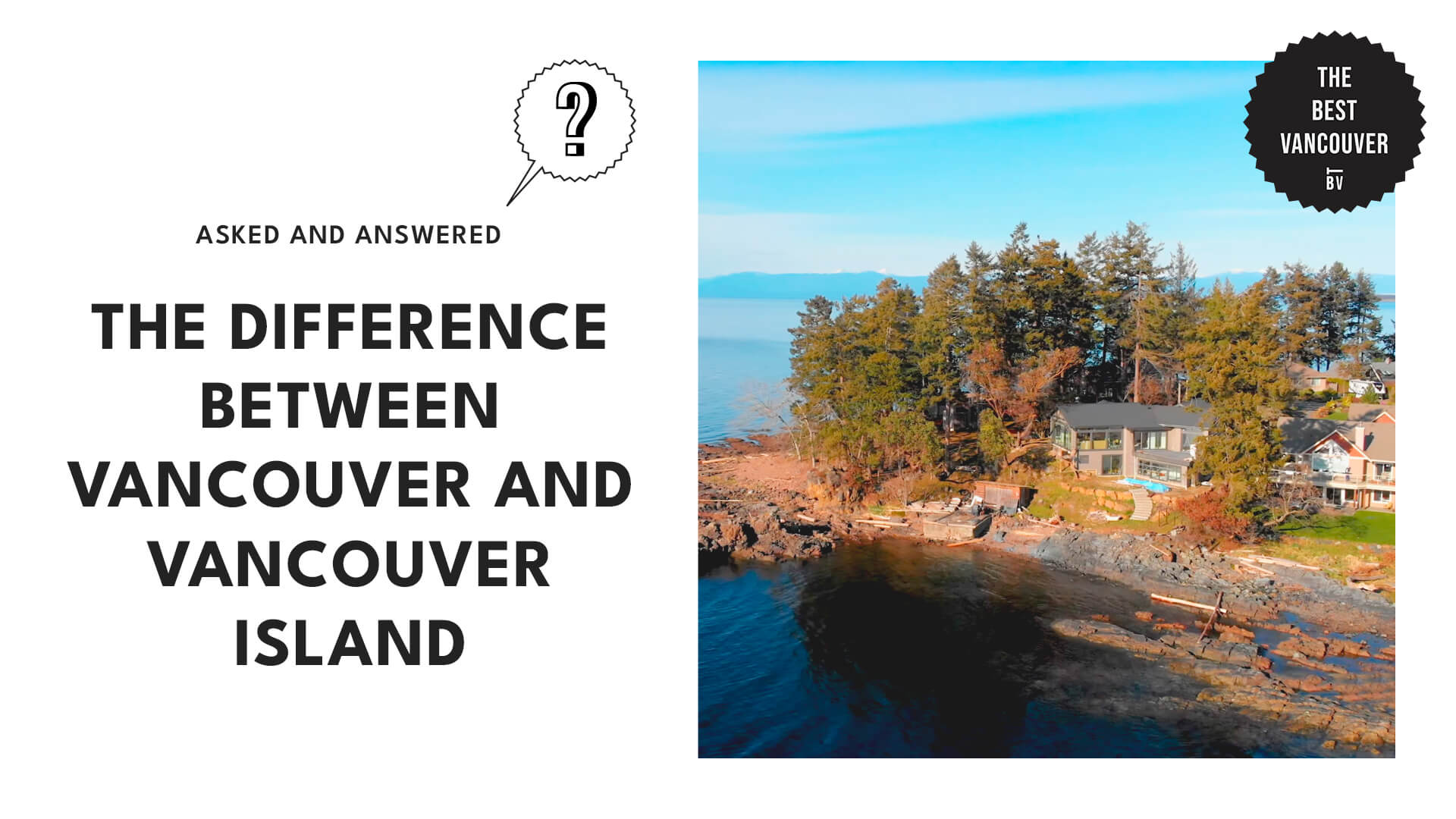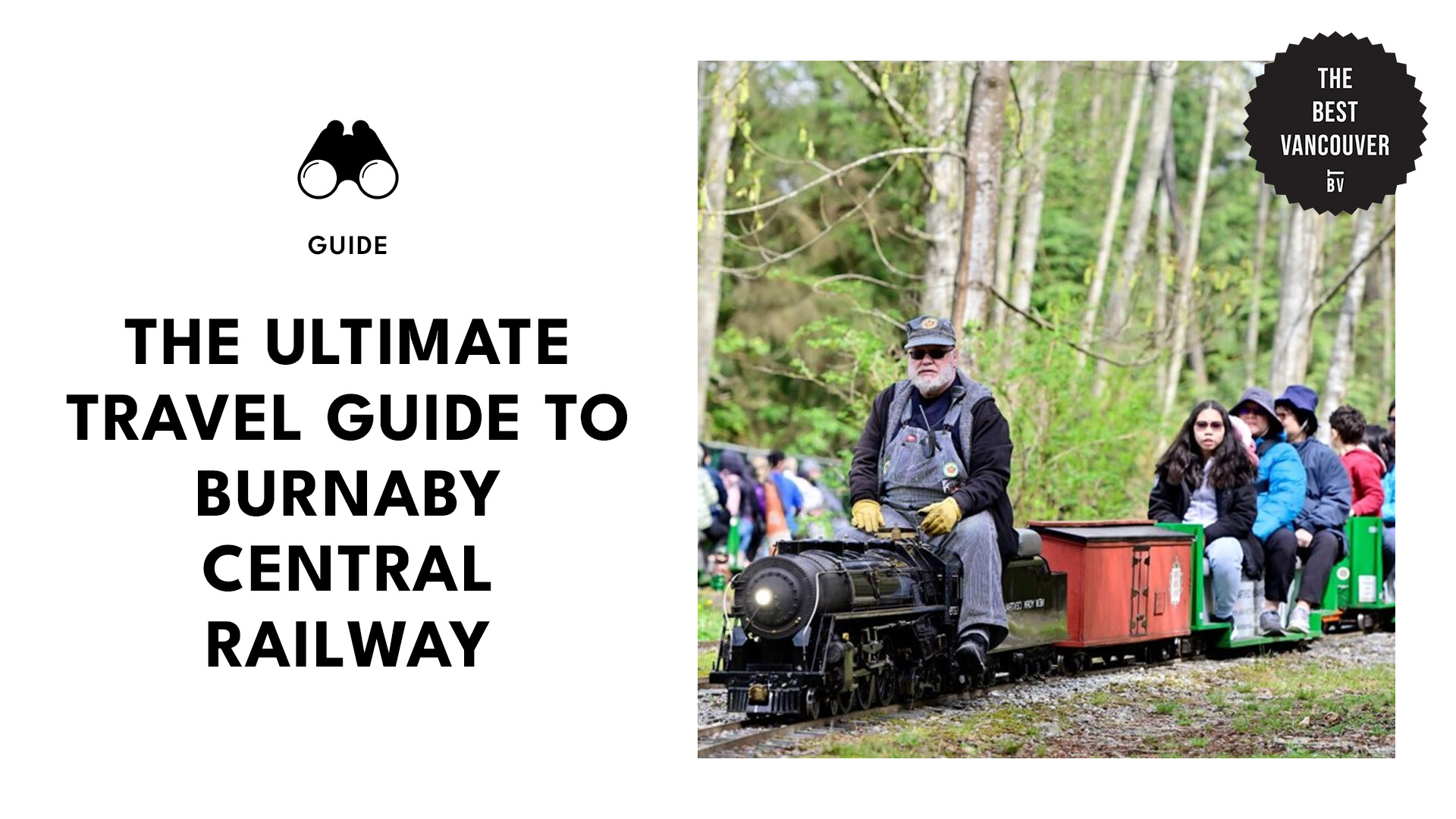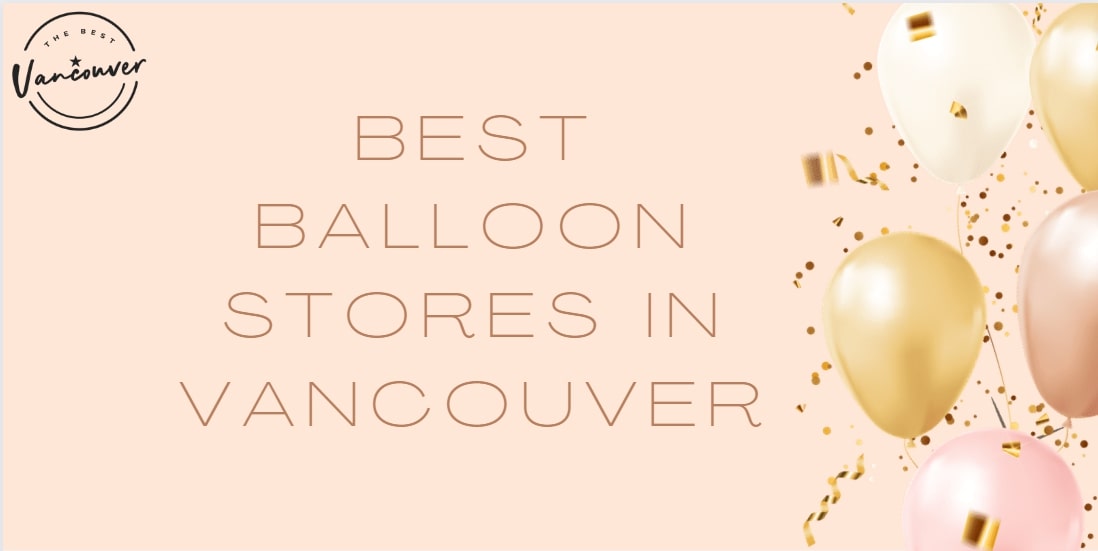The Difference between Vancouver and Vancouver Island
Vancouver and Vancouver Island are two distinct locations in British Columbia, but they’re both great places. There are numerous ways to distinguish between the two, but if you’re having trouble, keep reading.
Vancouver vs. Vancouver Island
Vancouver is the largest city in British Columbia and is located in the Lower Mainland region. On the other hand, Vancouver Island is an island off Canada’s Pacific Coast home to beaches, rainforests, and small communities.
Now, let’s get into the specifics.
Location
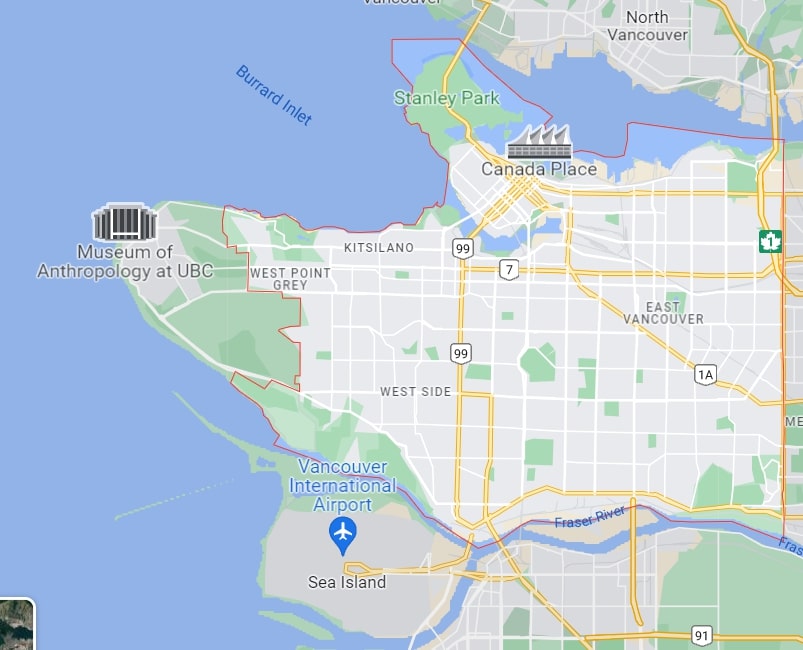
Image from Google Maps via https://www.google.com/maps
The City of Vancouver is located on the British Columbia mainland, west of the Burrard Peninsula. English Bay and the Burrard Inlet border the city to the north, and the Fraser River borders it to the south.
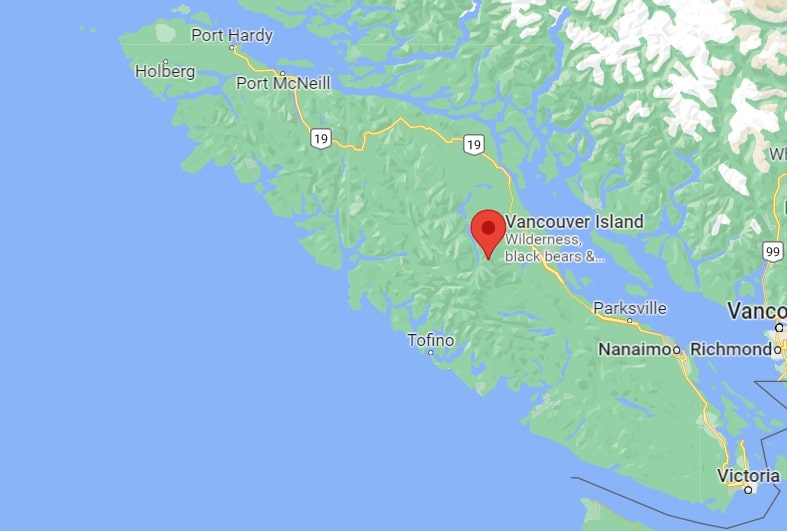
Image from Google Maps via https://www.google.com/maps
Vancouver Island, on the other hand, is one of the largest islands on North America’s Pacific coast, located in the southwestern part of mainland British Columbia. The Georgia, Johnstone, and Queen Charlotte Straits separate it from the rest of mainland Canada.
Climate
Vancouver and Vancouver Island’s climate is primarily temperate and wet. The weather is subject to the influence of the Pacific and North American patterns.
In the table below, we’ve listed the monthly average temperature of both locations to give you an idea of their climate conditions throughout the year.
Data by Weather Spark via https://weatherspark.com/
Vancouver has a moderate climate all year round because it’s protected by mountains and warmed by Pacific ocean currents.
This means that the city is never too hot or cold, and despite receiving less snowfall than other Canadian cities, Vancouver remains one of the top ski destinations in the world.
The hottest month in Vancouver is July, with an average high of 17°C, while the coldest month is December, with a low of 3°C. *
Meanwhile, summers on Vancouver Island are dry, and winters are wet. The island’s climate is one of the warmest in Canada, with September being the hottest month, with an average temperature of 19 °C.
This is why the island is a hotspot for summer activities, as it has ideal weather for outdoor recreation.
Housing Costs
In general, housing costs more in Vancouver than on Vancouver Island.
A single-detached house in Vancouver costs an average of CAD 1.5 million, while a home on Vancouver Island costs around CAD 856,700.
This is because Vancouver is more urbanized than Vancouver Island, with more commercial and industrial properties such as factories, buildings, schools, condominiums, and so on.
Both cities follow BC Property Laws, requiring at least a 20% down payment on homes worth more than CAD 1 million dollars. However, because Vancouver is already densely populated, finding a home is more difficult in the city.
Take a look at the table below to compare the cost of different types of properties in both locations:
If you’re looking to rent a property, we’ve listed the average renting costs for Vancouver and Vancouver Island:
Overall Housing Costs of Vancouver and Vancouver Island
Infrastructure
Although Vancouver’s real estate market has become increasingly crowded over the years, the city is still ranked fifth in an annual global evaluation of cities for quality of life.
This is because the city has constructed nearly all the infrastructures required to maintain a high-quality way of life, such as reservoirs, power plants, sewage treatment plants, stormwater drainage, and many others.
Furthermore, the City of Vancouver has implemented green rainwater infrastructure, which captures and cleans rainfall before returning it to the oceans and the atmosphere.
Vancouver Island has many different infrastructures, such as airports, railroads, power plants, and many alternative energy sources, such as wind turbines, tidal power, solar energy, and hydroelectric projects.
While the island still has a lot to work on, particularly in accessible highways and bridges, many government funds are currently being used to improve public transportation, bike paths, crosswalk lighting, and other projects.
Cost of Living
Vancouver is a city that is experiencing an upsurge in popularity, as more people recognize that it’s a great place to live.
As the city continues to grow, it also becomes more expensive than ever before as well. This increases the cost of living in Vancouver, which can be difficult for many expats and newcomers looking to move there.
If you’re considering a move to Vancouver Island and wondering if the cost of living will be too high, the answer is not necessarily yes. In fact, living on the island will cost you a lot less money than many people think.
In the table below, we’ve listed the different categories and their average estimated cost on both locations:
Overall, the cost of living in Vancouver is more expensive than on Vancouver Island regarding restaurants, groceries, public transportation, monthly utilities, childcare, and leisure.
However, when it comes to monthly utilities, Vancouver Island costs more as the island has limited energy resources compared to Vancouver.
If you want to get an idea of what your cost of living might be if you decide to relocate to these areas, you can use WorkBC’s cost of living calculator.
Population
With a population of over 2,632,000, Vancouver is a thriving metropolis. On the other hand, with just over 864,864 people, Vancouver Island has a much smaller population.
The different geographic areas of each region are the cause of the population size variation. Vancouver is located on the mainland of British Columbia, while Vancouver Island is off the province’s coast.
Vancouver and Vancouver Island populations are also different because of the different types of industries found in each region.
Vancouver is a central hub for business and finance, while Vancouver Island is known for its natural beauty and outdoor recreation.
This difference results in different types of people moving to each region.
Overall, the population size of Vancouver is much larger than Vancouver Island’s. However, both regions have unique characteristics that make them special places to live.
Culture and Lifestyle
Vancouver is known for its laid-back culture, which is largely due to the city’s scenic views of the North Shore mountains, stunning waterfront parks and establishments, and numerous public parks.
On the other hand, Vancouver Island is known for its active lifestyle, possibly because it’s a hot spot for surfing, hiking, camping, and other outdoor activities.
Although, the streets of Vancouver can get a little crowded compared to Vancouver Island which has nothing but wide open spaces.
Things to Do in Vancouver
Visit Stanley Park
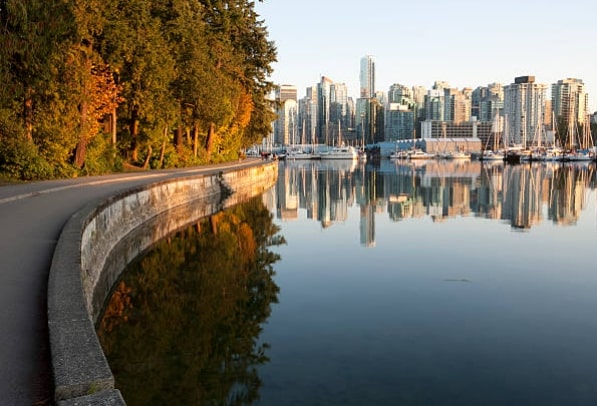
Image by iStock via https://www.istockphoto.com/
A trip to Vancouver Island would be incomplete without a visit to the city’s famous Stanley Park. This park is a secluded haven for Vancouverites away from the busy city streets.
It’s located at the edge of downtown Vancouver and features miles and miles of well-maintained walk paths, dirt trails, and bike routes, making it an ideal biking location for cyclists.
If you’re into gardens, the park is home to over four gardens: Ted and Mary Greig Rhododendron Garden, Rose Garden, Shakespeare Garden, and Stanley Park Rock Garden.
Furthermore, you must also visit the many famous landmarks in Stanley Park, such as the Brockton Point Totem Poles, Hollow Tree, Lost Lagoon, Siwash Rock, and many more.
Aside from that, the park has various food options where visitors can dine while taking in the scenery of the ocean and the tranquil ambiance of the forest.
Explore the VanDusen Botanical Garden
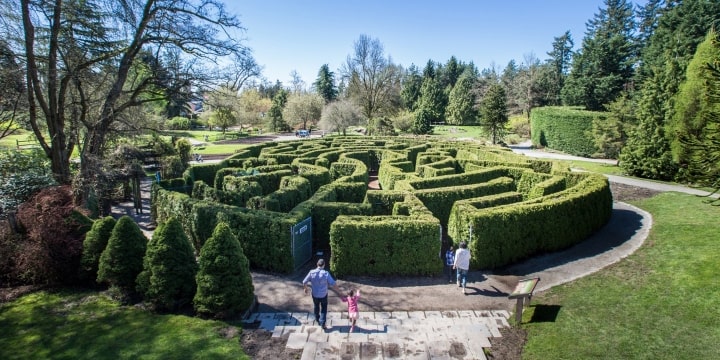
Image by the City of Vancouver via https://vancouver.ca
The VanDusen Botanical Garden, located in the Shaughnessy neighborhood, houses a fantastic collection of plants and trees worldwide.
The Vandusen Botanical Garden in Vancouver is a lovely place to learn and connect with nature. It covers approximately 55 acres and is home to over 7,500 plant species and varieties.
We suggest you drop by the Elizabethan Maze as it’s one of only six Elizabethan mazes in North America. The maze is filled with beautiful plants, flowers, pathways, and trees, but don’t worry about getting lost in it; it’s relatively simple to navigate.
We also recommend you take a photo shoot here because, besides being a famous garden, it’s also an ideal location for anniversaries, weddings, and other special occasions due to its beautiful scenery.
Things to Do on Vancouver Island
Join the Vancouver Island Whale Watch
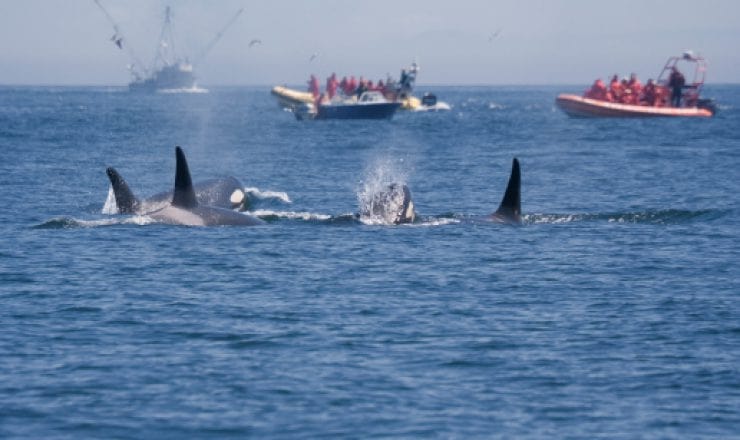
Image by Vancouver Island via https://amazingvancouverisland.com
Whale-watching is a popular activity on Vancouver Island! We strongly advise you to go whale-watching between March and October, as this is the time of year when whales migrate through the waters near the city.
Vancouver Whale Watch is one of many companies that provide an excellent whale-watching experience. They offer seasonal and guided tours led by professional naturalists with an impressive 95% success rate!
You might also see other marine mammals such as sea lions, seals, bald eagles, and many more.
Vancouver Whale Watch provides small and large whale watching tours ranging in price from CAD 95 to CAD 165.
Hike the Juan de Fuca Marine Trail
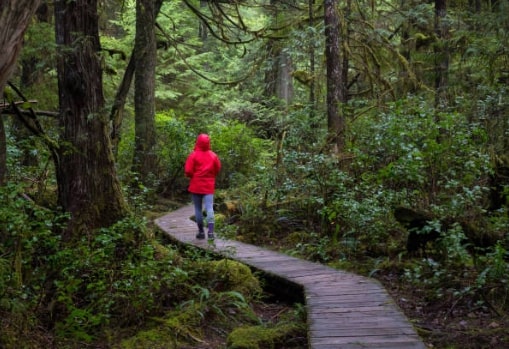
Image by iStock via https://www.istockphoto.com/
If you’re looking for something more intense, we recommend visiting the Juan de Fuca Marine Trail in your hiking sandals and most comfortable outdoor clothing.
This trail follows a 47-kilometer stretch of woods along the western shores of the southern Island. It usually takes up to 3 to 5 days, making it an incredible challenge with various terrain.
However, the trail has unpredictable weather and ever-changing conditions, so it’s good to prepare your complete hiking gear and equipment to avoid any mishaps.
A backcountry camping permit, which costs about CAD 10 per person/night, is required to hike the Juan de Fuca Marine Trail.
Summary of the Differences between Vancouver and Vancouver Island
To sum up, here’s a short recap:
- Vancouver is located on the British Columbia mainland. Vancouver Island is a large island on North America’s Pacific coast.
- Vancouver has a laid-back culture, while Vancouver Island is known for its active lifestyle.
- Climate is much more pleasant in Vancouver than on Vancouver Island.
- It’s more expensive to live in Vancouver than on Vancouver Island.
- Vancouver’s infrastructure is more complete, while developments on Vancouver Island are still ongoing.
- Vancouver is more populated than Vancouver Island.
We hope our article gave you some useful insights on the differences between the two. Each location has its own distinct and unique qualities but both are breathtaking in their own right.
Looking to learn even more? Check out these articles:

